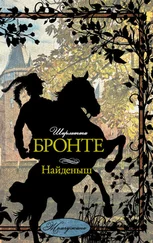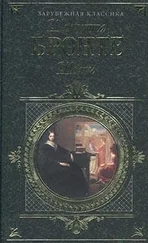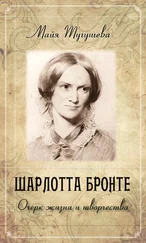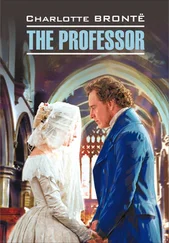Шарлотта Бронте - The Professor
Здесь есть возможность читать онлайн «Шарлотта Бронте - The Professor» — ознакомительный отрывок электронной книги совершенно бесплатно, а после прочтения отрывка купить полную версию. В некоторых случаях можно слушать аудио, скачать через торрент в формате fb2 и присутствует краткое содержание. Год выпуска: 2014, Издательство: epubBooks Classics, Жанр: Классическая проза, на английском языке. Описание произведения, (предисловие) а так же отзывы посетителей доступны на портале библиотеки ЛибКат.
- Название:The Professor
- Автор:
- Издательство:epubBooks Classics
- Жанр:
- Год:2014
- ISBN:нет данных
- Рейтинг книги:3 / 5. Голосов: 1
-
Избранное:Добавить в избранное
- Отзывы:
-
Ваша оценка:
- 60
- 1
- 2
- 3
- 4
- 5
The Professor: краткое содержание, описание и аннотация
Предлагаем к чтению аннотацию, описание, краткое содержание или предисловие (зависит от того, что написал сам автор книги «The Professor»). Если вы не нашли необходимую информацию о книге — напишите в комментариях, мы постараемся отыскать её.
The Professor — читать онлайн ознакомительный отрывок
Ниже представлен текст книги, разбитый по страницам. Система сохранения места последней прочитанной страницы, позволяет с удобством читать онлайн бесплатно книгу «The Professor», без необходимости каждый раз заново искать на чём Вы остановились. Поставьте закладку, и сможете в любой момент перейти на страницу, на которой закончили чтение.
Интервал:
Закладка:
In the daytime my house and establishment were conducted by Madame the directress, a stately and elegant woman, bearing much anxious thought on her large brow; much calculated dignity in her serious mien: immediately after breakfast I used to part with this lady; I went to my college, she to her schoolroom; returning for an hour in the course of the day, I found her always in class, intently occupied; silence, industry, observance, attending on her presence. When not actually teaching, she was overlooking and guiding by eye and gesture; she then appeared vigilant and solicitous. When communicating instruction, her aspect was more animated; she seemed to feel a certain enjoyment in the occupation. The language in which she addressed her pupils, though simple and unpretending, was never trite or dry; she did not speak from routine formulas—she made her own phrases as she went on, and very nervous and impressive phrases they frequently were; often, when elucidating favourite points of history, or geography, she would wax genuinely eloquent in her earnestness. Her pupils, or at least the elder and more intelligent amongst them, recognized well the language of a superior mind; they felt too, and some of them received the impression of elevated sentiments; there was little fondling between mistress and girls, but some of Frances' pupils in time learnt to love her sincerely, all of them beheld her with respect; her general demeanour towards them was serious; sometimes benignant when they pleased her with their progress and attention, always scrupulously refined and considerate. In cases where reproof or punishment was called for she was usually forbearing enough; but if any took advantage of that forbearance, which sometimes happened, a sharp, sudden and lightning–like severity taught the culprit the extent of the mistake committed. Sometimes a gleam of tenderness softened her eyes and manner, but this was rare; only when a pupil was sick, or when it pined after home, or in the case of some little motherless child, or of one much poorer than its companions, whose scanty wardrobe and mean appointments brought on it the contempt of the jewelled young countesses and silk–clad misses. Over such feeble fledglings the directress spread a wing of kindliest protection: it was to their bedside she came at night to tuck them warmly in; it was after them she looked in winter to see that they always had a comfortable seat by the stove; it was they who by turns were summoned to the salon to receive some little dole of cake or fruit—to sit on a footstool at the fireside—to enjoy home comforts, and almost home liberty, for an evening together—to be spoken to gently and softly, comforted, encouraged, cherished—and when bedtime came, dismissed with a kiss of true tenderness. As to Julia and Georgiana G―, daughters of an English baronet, as to Mdlle. Mathilde de ―, heiress of a Belgian count, and sundry other children of patrician race, the directress was careful of them as of the others, anxious for their progress, as for that of the rest—but it never seemed to enter her head to distinguish them by a mark of preference; one girl of noble blood she loved dearly—a young Irish baroness—lady Catherine ―; but it was for her enthusiastic heart and clever head, for her generosity and her genius, the title and rank went for nothing.
My afternoons were spent also in college, with the exception of an hour that my wife daily exacted of me for her establishment, and with which she would not dispense. She said that I must spend that time amongst her pupils to learn their characters, to be AU COURANT with everything that was passing in the house, to become interested in what interested her, to be able to give her my opinion on knotty points when she required it, and this she did constantly, never allowing my interest in the pupils to fall asleep, and never making any change of importance without my cognizance and consent. She delighted to sit by me when I gave my lessons (lessons in literature), her hands folded on her knee, the most fixedly attentive of any present. She rarely addressed me in class; when she did it was with an air of marked deference; it was her pleasure, her joy to make me still the master in all things.
At six o'clock P.M. my daily labours ceased. I then came home, for my home was my heaven; ever at that hour, as I entered our private sitting–room, the lady–directress vanished from before my eyes, and Frances Henri, my own little lace–mender, was magically restored to my arms; much disappointed she would have been if her master had not been as constant to the tryst as herself, and if his truthfull kiss had not been prompt to answer her soft, "Bon soir, monsieur."
Talk French to me she would, and many a punishment she has had for her wilfulness. I fear the choice of chastisement must have been injudicious, for instead of correcting the fault, it seemed to encourage its renewal. Our evenings were our own; that recreation was necessary to refresh our strength for the due discharge of our duties; sometimes we spent them all in conversation, and my young Genevese, now that she was thoroughly accustomed to her English professor, now that she loved him too absolutely to fear him much, reposed in him a confidence so unlimited that topics of conversation could no more be wanting with him than subjects for communion with her own heart. In those moments, happy as a bird with its mate, she would show me what she had of vivacity, of mirth, of originality in her well–dowered nature. She would show, too, some stores of raillery, of "malice," and would vex, tease, pique me sometimes about what she called my "bizarreries anglaises," my "caprices insulaires," with a wild and witty wickedness that made a perfect white demon of her while it lasted. This was rare, however, and the elfish freak was always short: sometimes when driven a little hard in the war of words—for her tongue did ample justice to the pith, the point, the delicacy of her native French, in which language she always attacked me—I used to turn upon her with my old decision, and arrest bodily the sprite that teased me. Vain idea! no sooner had I grasped hand or arm than the elf was gone; the provocative smile quenched in the expressive brown eyes, and a ray of gentle homage shone under the lids in its place. I had seized a mere vexing fairy, and found a submissive and supplicating little mortal woman in my arms. Then I made her get a book, and read English to me for an hour by way of penance. I frequently dosed her with Wordsworth in this way, and Wordsworth steadied her soon; she had a difficulty in comprehending his deep, serene, and sober mind; his language, too, was not facile to her; she had to ask questions, to sue for explanations, to be like a child and a novice, and to acknowledge me as her senior and director. Her instinct instantly penetrated and possessed the meaning of more ardent and imaginative writers. Byron excited her; Scott she loved; Wordsworth only she puzzled at, wondered over, and hesitated to pronounce an opinion upon.
But whether she read to me, or talked with me; whether she teased me in French, or entreated me in English; whether she jested with wit, or inquired with deference; narrated with interest, or listened with attention; whether she smiled at me or on me, always at nine o'clock I was left abandoned. She would extricate herself from my arms, quit my side, take her lamp, and be gone. Her mission was upstairs; I have followed her sometimes and watched her. First she opened the door of the dortoir (the pupils' chamber), noiselessly she glided up the long room between the two rows of white beds, surveyed all the sleepers; if any were wakeful, especially if any were sad, spoke to them and soothed them; stood some minutes to ascertain that all was safe and tranquil; trimmed the watch–light which burned in the apartment all night, then withdrew, closing the door behind her without sound. Thence she glided to our own chamber; it had a little cabinet within; this she sought; there, too, appeared a bed, but one, and that a very small one; her face (the night I followed and observed her) changed as she approached this tiny couch; from grave it warmed to earnest; she shaded with one hand the lamp she held in the other; she bent above the pillow and hung over a child asleep; its slumber (that evening at least, and usually, I believe) was sound and calm; no tear wet its dark eyelashes; no fever heated its round cheek; no ill dream discomposed its budding features. Frances gazed, she did not smile, and yet the deepest delight filled, flushed her face; feeling pleasurable, powerful, worked in her whole frame, which still was motionless. I saw, indeed, her heart heave, her lips were a little apart, her breathing grew somewhat hurried; the child smiled; then at last the mother smiled too, and said in low soliloquy, "God bless my little son!" She stooped closer over him, breathed the softest of kisses on his brow, covered his minute hand with hers, and at last started up and came away. I regained the parlour before her. Entering it two minutes later she said quietly as she put down her extinguished lamp—
Читать дальшеИнтервал:
Закладка:
Похожие книги на «The Professor»
Представляем Вашему вниманию похожие книги на «The Professor» списком для выбора. Мы отобрали схожую по названию и смыслу литературу в надежде предоставить читателям больше вариантов отыскать новые, интересные, ещё непрочитанные произведения.
Обсуждение, отзывы о книге «The Professor» и просто собственные мнения читателей. Оставьте ваши комментарии, напишите, что Вы думаете о произведении, его смысле или главных героях. Укажите что конкретно понравилось, а что нет, и почему Вы так считаете.











